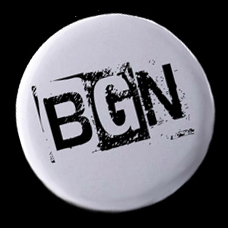|
In the inchoate days of punk (say 74-76) we
were pretty much left alone. No one seemed to care about us.
When the article came out, with it's focus on the bizarre, it was roundly
put down. We punkers were pissed.
The article appears below, give it a read.
But publicity and widespread attention came in 1977 along with the Sex
Pistols.
In the summer of 1977 when we heard that Time Magazine was coming to the
Rat we really were surprised.
Reading it now, it's doesn't seem as bad, but the pictures show that Time
was looking for the outrageous.
A parachute costume with fresh meat? Is this really representative of
anything?
What would you think of this music if all you had to go by was this article?
Anthems of the Blank Generation
July 11, 1977
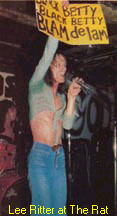 ITEM: In London, Singer Johnny
Rotten spits at the audience and cries out,
"I hate you!" Sizing up Johnny's four-letter words, tattered clothing and generally
repugnant personal deportment, the British Establishment decides that it hates
him. Johnny and his band, the Sex Pistols, are regularly banned from British
radio, concert halls and clubs. Nonetheless, the Pistols ' latest single, a Jubilee diatribe
against royalty called God Save
the Queen, is currently a bestselling record in Britain.
ITEM: In London, Singer Johnny
Rotten spits at the audience and cries out,
"I hate you!" Sizing up Johnny's four-letter words, tattered clothing and generally
repugnant personal deportment, the British Establishment decides that it hates
him. Johnny and his band, the Sex Pistols, are regularly banned from British
radio, concert halls and clubs. Nonetheless, the Pistols ' latest single, a Jubilee diatribe
against royalty called God Save
the Queen, is currently a bestselling record in Britain.
ITEM: In West Hollywood, members of a group called the Germs try to redeem a slow evening at the Whisky by smearing themselves with peanut butter.
ITEM: In Boston, the lead singer of the Dead Boys takes a swan dive to the stage floor of a joint called The Rat. He wears a leather jacket and a T shirt decorated with swastikas. He begins to stroke the torn crotch of his jeans with a vibrator. He shrieks, "This is what love is!"
ITEM: In New York, the up-and-coming Ramones decide to turn away from negative songs like I Don't Wanna Go Down to the Basement in favor of the upbeat Now I Wanna Sniff Some Glue.
ITEM: In Florida, Promoter Sidney Drashin declares that it is only a matter of time before the punk invasion begins there. Says he: "Our company believes it's going to break loose big. It's everywhere. "
 Ye gods, the thoughtful, thirtyish
ex-Beatles freak may well ask, what is
happening to the younger generation?
In Tokyo, Chicago and Paris, kids are
bumping, grinding, loving, hating, wailing to the loud, raucous, often brutal
sounds of punk rock. For a year or so,
punk has been flourishing in the seediest rock joints-a Bowery bar called
CBGB's in New York, a dingy cavern
called the Roxy in London, and The
Rat in Boston. There, shock is chic. Musicians and listeners strut around in
deliberately torn T shirts and jeans; ideally, the rips should be joined with
safety pins. Another fad is baggy pants
with a direct connection between fly
and pocket. These are called dumpies.
Swastika emblems go well with such
outfits. In London, the hair is often heavily greased and swept up into a cox
comb of blue, orange or green, or a
comely two-tone. Pierced ears may sport
safety pins, some made of gold or silver. Of late, punk chic has even been
taken up by a few high-fashion designers. But the punkers themselves are
beginning to tone down the safety-pin
excesses of a few months ago.
Ye gods, the thoughtful, thirtyish
ex-Beatles freak may well ask, what is
happening to the younger generation?
In Tokyo, Chicago and Paris, kids are
bumping, grinding, loving, hating, wailing to the loud, raucous, often brutal
sounds of punk rock. For a year or so,
punk has been flourishing in the seediest rock joints-a Bowery bar called
CBGB's in New York, a dingy cavern
called the Roxy in London, and The
Rat in Boston. There, shock is chic. Musicians and listeners strut around in
deliberately torn T shirts and jeans; ideally, the rips should be joined with
safety pins. Another fad is baggy pants
with a direct connection between fly
and pocket. These are called dumpies.
Swastika emblems go well with such
outfits. In London, the hair is often heavily greased and swept up into a cox
comb of blue, orange or green, or a
comely two-tone. Pierced ears may sport
safety pins, some made of gold or silver. Of late, punk chic has even been
taken up by a few high-fashion designers. But the punkers themselves are
beginning to tone down the safety-pin
excesses of a few months ago.
Buzz and Blast. Up on the stage
can be found a numbing array of groups
and soloists whose names dramatize the
nihilism and brute force that have inspired the movement: Clash, Thundertrain, Weirdos, Dictators, Stranglers,
Damned, and the demon-eyed New
Yorker who could become the Mick Jagger of punk, Richard Hell. The music
aims for the gut. Even compared with
the more elemental stylings of 1950s
rock 'n' roll which it closely resembles
punk rock is a primal scream. The
music comes in fast, short bursts of buzz
and blast. Some groups have but two or
three chord changes at their disposal, occasionally less: last week at CBGB's a
fledgling group set several unofficial records for length of time played without
changing chords at all.
 Even on the Bowery, lyrics are not
as rowdy as in Britain. Punk there is a
protest by Britain's working-class children, who have no memory of swinging London and cannot find jobs. Detractors of punk would argue that these
children are coddled by a very expensive welfare state and are feeling sorry
for themselves. Still, the Sex Pistols' piledriving Anarchy in the U.K. is an anthem of despair. The British punk bands
are a community linked by anger and
frustration. They are, within the music
world, a rebuke to the bourgeois excesses
and smooth musical stylingsof such
stars as Elton John and Peter Frampton.
Even on the Bowery, lyrics are not
as rowdy as in Britain. Punk there is a
protest by Britain's working-class children, who have no memory of swinging London and cannot find jobs. Detractors of punk would argue that these
children are coddled by a very expensive welfare state and are feeling sorry
for themselves. Still, the Sex Pistols' piledriving Anarchy in the U.K. is an anthem of despair. The British punk bands
are a community linked by anger and
frustration. They are, within the music
world, a rebuke to the bourgeois excesses
and smooth musical stylingsof such
stars as Elton John and Peter Frampton.
Says Johnny Rotten: "The millionaire groups were singing about love and
their own hang-ups. That's stupid. You
don't sing about love to people on the
dole." Blithefully, whiningly, punk says
anything and everything. As the Sex Pistols chant, "God save the Queen/ She
ain't no human being."
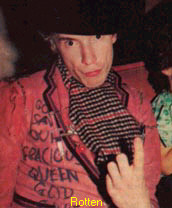 Despite some of the revolting accouterments, there is real musical value in
much of punk rock. More and more, the
punkers find themselves being referred
to as members of yet another New
Wave. Sex Pistols Manager Malcolm
McLaren regards that as highfalutin,
calling the phrase "Establishment language, more descriptive of a new hairstyle than anything else." In truth, New
Wave does seem an apt catch-all label
for the energetic and varied kind of music that has emerged in recent months
from some of the young American
bands. The Ramones stick close to basic
rock 'n' roll, but they get better all the
time. Last week their latest single Sheena is a Punk Rocker made the Billboard
Hot 100 chart, the first New Wave song
to achieve that eminence.
Despite some of the revolting accouterments, there is real musical value in
much of punk rock. More and more, the
punkers find themselves being referred
to as members of yet another New
Wave. Sex Pistols Manager Malcolm
McLaren regards that as highfalutin,
calling the phrase "Establishment language, more descriptive of a new hairstyle than anything else." In truth, New
Wave does seem an apt catch-all label
for the energetic and varied kind of music that has emerged in recent months
from some of the young American
bands. The Ramones stick close to basic
rock 'n' roll, but they get better all the
time. Last week their latest single Sheena is a Punk Rocker made the Billboard
Hot 100 chart, the first New Wave song
to achieve that eminence.
Television, which got its start at CBGB's, wraps its big beat in mellifluous instrumental colors. Lead Singer Tom Verlaine's lyrics, like the following from Venus, are among rock's finest in years:
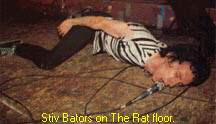 Tight toy night; streets were so
bright.
Tight toy night; streets were so
bright.
The world looked so thin and
between my bones and skin
there stood another person who
was a little surprised
to beface to face with a world so
alive.
I fell.
Richard Hell's Blank Generation, delivered over a throbbing four-note bass ostinato, is already a punk classic:
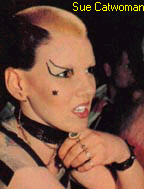 I was sayin ' let me out of here
I was sayin ' let me out of here
before I was even born.
It's such a gamble when you get a
face...
I belong to the blank generation,
And you can take it or leave it each time.
Sire Records' Seymour Stein, an early champion of punk, finds that the music reflects a mood of total indifference among the young. "They feel they had nothing to do with making the world the mess it is today, and they're also not going to do anything to make it any better because they can't. They come to the music for the sake of the music, for entertainment, for getting it on." Getting it on, of course, means love and sex, passions that old time rock 'n' roll had plenty to say about. But today's punk rockers have no time for euphemisms like Chuck Berry's "ding-a-ling." Four-letter words are not spared. And when Thundertrain bawls, " I'm hot, hot. hot, hot for teacher," there is no missing the point. The 1970s have been dominated by graduates of the 1960s rock era Paul Simon and Paul McCartney moving out on their own, groups like the Rolling Stones, the Grateful Dead and Jefferson Starship rambling on as before. The New Wave seems to be saying, "The superstars are dead. Long live the superstars." Down with the smooth confections of commercial rock, even the harmless purr of disco. Says one punk devotee: "Disco was the final straw." Willie ("Loco") Alexander, leader of a Boston band, revels in the studied toughness, calculated cool and throbbing boom-boom of the New Wave. Says he: 'Punk looks right at you and says something."
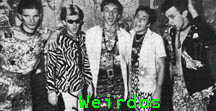 That something has until recent
months been too aggressive for the record companies, who in turn have to bear
in mind the strictures of radio. Signing
with Private Stock Records, the group
Blondie agreed to change "sex-offender"
to "ex-offender." Not all New Wave
groups are going to be that docile. The
aura of rebellion is crucial to punk's
pleasure.
That something has until recent
months been too aggressive for the record companies, who in turn have to bear
in mind the strictures of radio. Signing
with Private Stock Records, the group
Blondie agreed to change "sex-offender"
to "ex-offender." Not all New Wave
groups are going to be that docile. The
aura of rebellion is crucial to punk's
pleasure.
Swing-bred parents of the
1950s may have found Elvis Presley corrupt (as did CBS-TV, which cut him off
above the pelvis), but the kids loved him,
Folk- and rock-bred parents of the 1970s
may not love the Dead Boys, but a lot of
the kids do. The biggest catastrophe for
punk rock would of course be huge success. How does a rebel maintain his pose
while earning $1 million a year?
links | contact us
